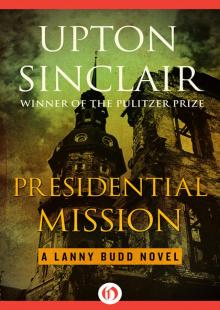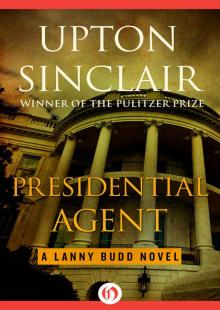- Home
- Upton Sinclair
Dragon Harvest Page 5
Dragon Harvest Read online
Page 5
Also, he danced well; and if he didn’t make love to her, but was just friendly and respectful, that was perhaps the best thing he could have done; for in her heart the girl was still a child, and was in a tumult of excitement, not unmixed with alarm. This was really her début, and a wonderful experience, almost beyond imagining. All these important grand people, many of them foreigners with titles; the women staring at her through lorgnettes, the men ogling her, even the old ones. She needed someone to tell her that this was the European way and she mustn’t mind; someone to tell her who was who, and where they came from—romantic-sounding names out of the history books.
Lizbeth had a teacher on the yacht, a maiden lady who gave her lessons in history and literature every morning. The girl hadn’t studied enough to hurt her, but she had picked up odds and ends, and of course had learned geography in the chart room of the yacht, and from seeing it loom up on the horizon. She could chatter in French, and when she stumbled over a word, she blushed so exquisitely that where was the Frenchman who could not forgive her? Surely not in the Midi! They swarmed around her like bees on a dish of sugar water; they poured out their hearts to her on the dancing floor, greatly to her confusion, and in the ten-day stay of the Oriole her father received half a dozen formal proposals by mail. “The French are fast workers—where American money is involved.” So declared the Baroness of the Little Tower, who had been worked that way herself, and now said: “Never again!”
IX
Beauty Budd made no formal proposals, for that was not the American way. What she did was to invite father and daughter to Bienvenu; no showy affair, but a quiet dinner en famille, with Emily and Sophie and Sophie’s husband as the only other guests. The one-time artist’s model preferred the evening, when she could see to the lighting in all the rooms. Here at home she could show what she had been, for on the wall hung the painting which Marcel had made of her, standing in the doorway of the studio in the fullness of her glory—and Miss Lizbeth of Baltimore surely had nothing on the former toast of the Paris ateliers. On the opposite wall was the painting called Sister of Mercy, which Marcel had made after his face had been burned off in the early days of the war, and after Beauty had nursed him back to life. That was one of the famous paintings of modern France, and had been shown in one-man exhibitions in Paris, London, New York, and Berlin. In Munich it had been shown to Hitler in the Braune Haus; and while that didn’t add to the work’s value as art, it certainly helped to make drawing-room conversation.
There were other Detazes on the walls of this home: landscapes and seascapes of the Cap, and others of Greece and Africa which Marcel had painted during the cruise of the Bluebird. The family from the Oriole might learn that other people, also, had seen the world from the deck of a trim white vessel. There is such a thing as owning docks and railroad terminals on Chesapeake Bay, and again there is such a thing as owning treasures of beauty which mankind will enjoy for ages—and who but the most purse-proud would question which is the more honorific possession? Reverdy Holdenhurst was apparently not among the questioners, for he asked to be taken to Lanny’s studio and shown more of the paintings, and before he left he made a timid inquiry as to buying a couple of them for the saloon of the Oriole. He had to be careful, these days, he said, for the new income tax schedules made it hard to own and operate a yacht; but when he learned that he could have his choice of the land and seascapes for eight thousand dollars each, he elected to come the next day and make a daylight view.
Dinner one day and tea the next was getting really chummy. Lanny opened up the storeroom which formed the back part of his studio, and José, the lame Spaniard, carried out the paintings and set them up on easels for inspection. Lanny delivered one of those carefully studied discourses whereby he impressed and at the same time instructed the well-to-do. Since money was being spent for art, it might as well be for good art, and the improving of public taste was a service, as well as the means to a comfortable livelihood. Lanny was assisting in the making of several collections which would someday be willed to the public, and he took a lofty tone, not merely in order to impress his clients, but because that was the way he felt about his job. Somebody had to study and think and compare, and learn art values, and money values in relation to art; if persons who hadn’t had time for all that wanted expert advice, Lanny Budd would furnish it to them on a ten-per-cent commission basis. They would trust his integrity, and if at any moment they showed hesitation in so doing, he would advise them to get some other expert.
X
The picture viewing completed, Lanny took the belle of the Oriole for a stroll about the grounds of Bienvenu. They were full of a lifetime’s memories, and he told her some. This second studio had been built for Kurt Meissner, during the years he had been preparing to become a great Komponist. Lizbeth had never heard of him, so Lanny told about him, of course not mentioning that he had been Beauty’s lover, or that he was now a Nazi agent in Paris. When Lanny mentioned the Nazis, it was only to tell amusing and picturesque things, such as Marshal Göring keeping a lion cub in his home, and the retreat which Hitler had built himself on the top of a mountain, the only access being through a tunnel and a shaft in which a bronze elevator went up seven hundred feet through solid rock.
It was as if Lanny were saying: “Would you like to travel to Germany and see all these fascinating sights?” And again: “Would you like to live in these houses, and see these views and meet these friends every day?” He could be pretty sure that Lizbeth was thinking these thoughts; no doubt her father was doing the same, and surely Beauty and Emily and Sophie were helping all they could. A girl thinks such thoughts about every likely man she meets, and picks up hints from the older women, and watches for the signs of what the man is thinking. There is a tumult in her heart, for it is all so new and strange to her; she is taken by surprise and overwhelmed by thumpings inside and warm flushes of the cheeks. She has to make an all-important decision, and sometimes it is now or never.
Lanny perceived that Lizbeth was on tiptoe with excitement; the world was marvelous to her—and this always seemed tragic to Lanny, because he knew it was in so many ways a cruel world, and especially hard on women. Many kinds of trial lie before them, and those who are having things easiest are often the least prepared. This one, he realized, had led a sheltered life—very much like that which his own little daughter, Frances, was now leading in England. Another “poor little rich girl,” with servants to wait on her and hand her everything she asked for; never having to make any effort, no struggle or strain, nothing to develop her mental muscles. The result was, she was a woman in body, but in mind and character a child; nobody could say what her capacities were—not even she herself.
He talked to her on her own level. On this little beach below them he had played as a boy with the children of the fishermen. They had hauled little seines—they ragged and barefooted, he in bathing trunks. They had brought in strange creatures; he described them, and Lizbeth was interested. On the beach in front of the village, now littered with the almost nude bodies of pleasure-seekers, there had been thirty years ago only a few bathers, and there had come a strolling fiddler each day; Lanny’s mother provided a centime, for which price the man would play for a while, and the children would dance and caper. That, too, pleased Lizbeth, who had always had her pleasures laid out for her and had never known what it was to wander at her own sweet will. There had always been a governess or someone to tell her where to go and what to do.
Lanny sounded her out tactfully, and decided that she had no trace of what he called “social” feeling. She took the great and powerful to be exactly what they claimed; she admired them, and was thrilled to meet them, and imagined fairy tales about them. She was a snob, but not self-made; she had received the opinions of the people about her and had never thought of questioning them. The rich were that because they were superior and had the right to be. The poor existed to be servants, and to produce things and be paid and be grateful. The world was a garden of deli
ghts made for the Holdenhurst family and their friends, and now Lizbeth was about to be turned loose in it to take whatever pleased her fancy.
Lanny might have taught her some of his ideas; at any rate he might have made gentle tentatives, to see what interest he could awaken. But his tongue was tied, his job kept him mute. Imagine Lizbeth going to her father and saying: “Mr. Budd thinks we rich people have too much money, and that income taxes are all right.” Imagine her saying to the guests on the yacht: “Mr. Budd says there aren’t enough jobs to go round, and that is why the working people are getting so discontented.” Such a story would go the rounds of the smart set in a few days; and how then could Lanny expect to have confidential talks with Juan March and the Duke of Alba, with Charles Bedaux and Baron Schneider, with Lord Beaverbrook, the Duke of Windsor, and ex-King Alfonso of Spain? In his youth Lanny had been conspicuous as a “Pink,” and it had taken years of careful and subtle maneuvers to slide himself into the position of ivory-tower dweller and sympathizer with the status quo. Even his own mother and father had to be kept uncertain, and the persons who shared his secret could be counted on the fingers of his two hands: Bernhardt Monck and the two Palmas, President Roosevelt and one of his aides, and the members of the Pomeroy-Nielson family in England. That was all, and there must be no more.
So if Lanny asked this girl to marry him he would be hiding his real self, and taking a chance of wrecking her happiness and his own. What would she make of his trips into Germany, of the cryptic notes and the meetings on street corners at night? Of visits to Washington, about which no word must be said? And suppose he got caught in Naziland, as had several times come so close to happening in the past? He could hear Lizbeth saying, as he had heard Irma: “What right did you have to lie to me? If you loved me, why couldn’t you trust me?” Thinking such thoughts, Lanny would become reserved—and at the same time aware that this aloofness might only be making him more attractive.
XI
Hospitality such as the Holdenhursts had enjoyed had to be returned, and so the father planned an excursion. The first warm and calm day, Lanny would bring his mother and her husband, and Sophie would bring her husband and Emily to the yacht at about eleven in the morning, and they would proceed eastward along the coast, having lunch on board; they would go ashore at Monte Carlo, visit the casino and try their luck at gambling, maybe dance for a while or attend a picture show, dine at Ciro’s, most swanky, and then come home in the evening. A delightful expedition, shared by guests who had come seven-eighths of the way around the world in the Oriole, and by the French lady teacher and a man secretary.
In the course of the sailing or steaming, or whatever it is that a Diesel-powered yacht may be said to do, Lanny found himself strolling on deck with the host, who had just sent him a check for sixteen thousand dollars, and now surprised him by an invitation to become a guest for the trip to the United States. They would go down the African coast, but not ashore, it being a fever district. They would cross to the bulge of Brazil and pay a visit to Rio; then northward, perhaps to Havana and to the Bahamas and Florida. Reverdy always planned his cruises to arrive in the Chesapeake by the latter part of April, but if business called Lanny Budd he could take a plane from Rio or from some other stop on the way.
A man of the world realized at once what such an invitation meant. He was what his world called “eligible,” and Reverdy was an attentive father, who would not have failed to note his daughter’s enjoyment of this eligible man’s company. Reverdy had listened to Lanny’s conversation, as well as his piano playing; he had visited his home and met his mother and the people of her set; most important of all, he had had long talks with his old friend, the salonnière of Cannes, who had known both Lanny and Reverdy from their beginnings on earth, and talked to them both as a mother. Reverdy wouldn’t hesitate to tell her what was on his mind, and to ask questions about a possible son-in-law. Emily would explain Lanny’s divorce on the grounds that Irma Barnes had been a thoroughly selfish woman. Having helped to make that match, Emily had it on her conscience, and she loved Lanny as if he were her son.
Would she have mentioned that Lanny’s father had never married Lanny’s mother and divorced her, as the world had been led to believe? Probably so; for Emily shared a bitter secret about Reverdy himself, which had broken his married life and precluded his being too severe upon other men’s irregularities. A few years after his marriage his rigid and proper wife had found him in the embraces of a maid in the household. The wife had never been able to forgive him, in spite of his efforts at atonement; they had never since been man and wife, though she kept the home and conformed to all the proprieties. She was a beautiful woman, rich in her own right, and devoted herself to building up the musical and other cultural life of her home city, which was growing too fast for what she considered its good. Reverdy still adored her, and perhaps as a means of making his life tolerable, had persuaded himself that a celibate life was advisable for one in his delicate state of health.
Doubtless he was taking a great deal upon himself to plan his daughter’s future without waiting to consult her mother. Certainly he was doing that deliberately when he invited the genial and fascinating Lanny Budd to be her traveling companion over a period of ten weeks or so. Moonlight in tropical and subtropical climes, the swish of water from a yacht’s prow and its sparkle on the waves, the murmur of the wind through palm branches ashore—these things are surely not conducive to celibacy. What Reverdy Johnson Holdenhurst was saying to Lanny Prescott Budd, only a decade or so younger than himself, was something like this: “I am offering you first chance, over all the swains who will be waiting for her and will begin laying siege to her the moment she arrives under her mother’s wing.”
And likewise Lanny knew exactly what he was doing when he answered: “You are paying me a compliment, Mr. Holdenhurst, and I wish I could accept; but I have just had a letter from my father, telling me that he is expecting to be in Paris very soon, and needs me to go into Germany with him. I have business there, too, and engagements which I can hardly break.”
XII
After that these, two men of the world talked about public affairs. Reverdy knew that Lanny had contacts with influential persons in the great capitals, and he asked what the prospects were. Lanny had to tell him that he thought they were as bad as possible; Europe was teetering on the edge of war, and it could hardly be postponed more than a year. Lanny told what he was free to tell about preparations in Germany, France, and Britain; he was in a strategic spot because his father made, fighter airplanes—the B-E P11 the latest, though the U.S. Army had given it a different designation. Robbie Budd had staked his future upon the belief that such planes would decide the destiny of nations, and now he was winning out. Those same officials of army and navy who had formerly given him the cold shoulder were coming to him, or calling him on the telephone from far parts of the world. Formerly they had been exacting and dilatory; now they would take whatever they could get, and price appeared to be no object. The plant was getting under full steam, as Robbie had been dreaming it and promising his stockholders for years.
Reverdy was interested. He had found the business game too strenuous for himself, but he liked to hear about other men’s efforts. Robbie Budd’s had been a success story, typical of America; he had been slighted all his youth and manhood by his stern old Puritan father, and his efforts had been a sort of defiance of that father, even after the father was dead. Ten years ago the family had got caught in the panic, and a Wall Street syndicate had taken over Budd Gunmakers; but here was Robbie on his own, showing his fellow-townsmen that he was the best Budd of them all. If war actually broke out, the company would be caught up in a whirlwind; Lanny had seen it happen to the munitions plant a quarter of a century ago, and it had made an indelible impression upon his boyish mind.
Did all this make an impression upon the mind of a valetudinarian who had retired from money-getting, but who still lived in a world that was run by money? He said: “Your father
must be a remarkable man. I should like to meet him.”
Lanny, who also lived in a money world, and had never been allowed to forget it, replied, politely: “It would give him great pleasure, I am sure.” He didn’t add: “If you could run up to Paris—” for that might suggest eagerness on his part.
“I suppose,” ventured Reverdy, “that with a business expanding like that, he can always use more capital.”
“Yes, indeed; it is a perpetual problem for him.”
“I don’t have much to invest these days, for, as you know, we have a government which seems determined to exterminate us ‘economic royalists.’ But I sometimes have a few dollars left over.”
This was an old, old song in Lanny’s ears, and he knew that he must take it seriously and look sober, as at a funeral. The rich were becoming poor, and everything was going to the demnition bow-wows. Men of great affairs couldn’t see how the world could possibly get along without them; and yet Lanny had seen them, one by one, descending into their graves, and becoming futile spirits trying to give advice through Madame Zyszinski—and nobody but Lanny and his stepfather paying the slightest attention to them!
XIII
He couldn’t very well help telling his mother about the yachting invitation, and of course it was like poking into a beehive. “Oh, Lanny! How could you refused?” and “Don’t you see what that means? The girl is in love with you! He’d never dream of asking you if she hadn’t wanted it.” And then a barrage of questions: “What is it that you really have to do in Germany? Robbie knows everybody there by now; and what is the sale of a picture compared with a chance like this?”
The ladies of the beehive got busy. The yacht was supposed to sail the next day, but Emily Chattersworth, most dignified and even austere of schemers, sat down to telephone. She called a villa in a place called Californie on the heights above Nice, temporarily occupied by a certain Edward Albert Christian George Andrew Patrick David, Duke of Cornwall and Earl of Chester, and recently created Duke of Windsor. She spoke with His Grace’s bride, who had been born Warfield and christened Bessie Wallis, and had been raised in a little red brick house on Biddle Street in Baltimore. It was an unfashionable neighborhood, and few Baltimoreans had paid any attention to either the birth or the christening; but they had all heard of her now, and recalled that her mother was a Montague, and the Montagues were “F.F.V.’s”—which, if you live in that part of the world, you know means “First Families of Virginia.”

 Prince Hagen
Prince Hagen Dragon Harvest
Dragon Harvest The Jungle
The Jungle Sylvia's Marriage
Sylvia's Marriage Oil! A Novel by Upton Sinclair
Oil! A Novel by Upton Sinclair The Coal War: A Novel
The Coal War: A Novel Presidential Agent
Presidential Agent World's End
World's End The Second-Story Man
The Second-Story Man O Shepherd, Speak!
O Shepherd, Speak! Wide Is the Gate
Wide Is the Gate The Return of Lanny Budd
The Return of Lanny Budd One Clear Call I
One Clear Call I 100%: the Story of a Patriot
100%: the Story of a Patriot The Machine
The Machine Presidential Mission
Presidential Mission A Cadet's Honor: Mark Mallory's Heroism
A Cadet's Honor: Mark Mallory's Heroism Between Two Worlds
Between Two Worlds World's End (The Lanny Budd Novels)
World's End (The Lanny Budd Novels) Between Two Worlds (The Lanny Budd Novels)
Between Two Worlds (The Lanny Budd Novels) The Coal War
The Coal War Presidential Agent (The Lanny Budd Novels)
Presidential Agent (The Lanny Budd Novels) Oil (filmed as There Will Be Blood)
Oil (filmed as There Will Be Blood) Wide Is the Gate (The Lanny Budd Novels)
Wide Is the Gate (The Lanny Budd Novels)